#GCP DevOps Training
Explore tagged Tumblr posts
Text
GCP DevOps Online Training | GCP DevOps Training in Hyderabad
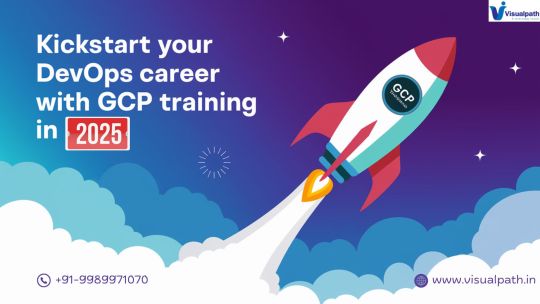
Kickstart Your DevOps Career with GCP Training in 2024
GCP DevOps Online Training offers an exciting opportunity for anyone eager to dive into the world of cloud computing. Google Cloud Platform (GCP) is rapidly becoming a preferred choice for businesses looking to streamline their operations, and mastering DevOps on this platform is a great way to boost your career. GCP DevOps Training in Hyderabad program is designed to help learners gain practical skills in deploying, automating, and managing applications and infrastructure on the cloud. With hands-on experience in tools like Kubernetes, Terraform, Cloud Build, and CI/CD pipelines, trainees will be well-equipped to tackle real-world challenges in cloud-based environments.
The flexibility of GCP DevOps Online Training makes it an ideal choice for professionals and beginners alike. Learners can access high-quality course materials at their own pace, making it easier to balance learning with work or other commitments. This online training is tailored to provide the best of both worlds: comprehensive theory paired with valuable practical experience. Whether you are looking to shift careers or enhance your existing skills, GCP DevOps Online Training ensures you gain the expertise needed to succeed in the competitive world of cloud technology.
Why GCP DevOps Training in Hyderabad Is a Great Choice
For those who prefer in-person learning, GCP DevOps Training in Hyderabad offers a hands-on experience in one of India’s top tech hubs. Hyderabad is home to numerous IT companies, including global giants like Google, Microsoft, and Amazon. As a result, the city is a great place to learn cloud computing and DevOps practices. GCP DevOps Training in Hyderabad provides a structured curriculum that bridges the gap between theoretical knowledge and practical application, with opportunities to work on live projects and real-world use cases.
In addition to expert-led sessions, GCP DevOps Training in Hyderabad allows students to network with industry professionals, giving them the opportunity to learn from those already working in cloud and DevOps roles. The proximity to major tech companies means that trainees can benefit from up-to-date knowledge of industry trends and best practices. Whether you are just starting out or are looking to upskill, the training program in Hyderabad can open doors to exciting job prospects and help you build a strong professional network.
Building a Strong Foundation with GCP DevOps Tools
A key feature of GCP DevOps Online Training or GCP DevOps Training in Hyderabad is its focus on building a solid foundation in both Google Cloud technologies and DevOps principles. Students will learn how to work with core GCP services like Compute Engine, Cloud Storage, Cloud Functions, and Kubernetes Engine, while also gaining hands-on experience in automating workflows and managing infrastructure as code. Understanding CI/CD principles is central to this training, as it helps students deploy and manage applications with speed, reliability, and minimal human intervention.
Moreover, GCP DevOps Training covers important topics such as monitoring, version control, and incident management, which are crucial in modern DevOps practices. The training program equips students with the knowledge to address real-time challenges, troubleshoot effectively, and optimize cloud resources for cost and performance efficiency. With this foundation, learners are ready to take on complex cloud projects and build scalable, high-performance applications using GCP.
Conclusion
In conclusion, GCP DevOps Online Training and GCP DevOps Training in Hyderabad provide valuable opportunities to learn the skills necessary to succeed in cloud computing. As companies increasingly turn to Google Cloud for their digital transformation, there is a rising demand for professionals proficient in DevOps practices. Whether you choose the flexibility of online training or the immersive experience in Hyderabad, enrolling in these programs will set you on the path to a successful career in cloud and DevOps technologies. Kickstart your journey today and stay ahead in this fast-evolving field!
Google Cloud is at the forefront of cloud technology, and with a solid understanding of GCP DevOps practices, you can contribute to developing scalable, efficient, and cost-effective solutions for businesses around the world. By honing your skills in the best DevOps tools and methodologies, you will not only enhance your career prospects but also join the ranks of highly skilled professionals who are shaping the future of cloud computing.
Don't wait—kickstart your DevOps journey with GCP today! With flexible training options available, now is the time to embrace the future of cloud and DevOps technologies.
Visualpath is the Leading and Best Institute for learning in Hyderabad. We provide GCP DevOps Certification Training. You will get the best course at an affordable cost.
Attend Free Demo
Call on – +91-9989971070
Blog: https://visualpathblogs.com/
What’s App: https://www.whatsapp.com/catalog/919989971070/
Visit: https://www.visualpath.in/online-gcp-devops-certification-training.html
#GCP DevOps Training#GCP DevOps Training in Hyderabad#GCP DevOps Online Training#DevOps GCP Online Training in Hyderabad#GCPDevOps Online Training Institute#GCP DevOps Certification Training#DevOps on Google Cloud Platform Online Training
0 notes
Text
Certification Exam Center | PMP CISA CISM Oracle CCNA AWS GCP Azure ITIL Salesforce Institute in Pune

The Certification Exam Center in Pune offers a range of certification exams for professionals in the IT industry. These certifications are highly valued and recognized worldwide, and passing them can significantly enhance one's career prospects. The center offers exams for a variety of certifications, including PMP, CISA, CISM, Oracle, CCNA, AWS, GCP, Azure, ITIL, and Salesforce Institute. The center provides a convenient and comfortable environment for taking the exams. It has state-of-the-art facilities and equipment to ensure that candidates have a smooth and hassle-free experience during the exam. The exam rooms are spacious and well-lit, with comfortable seating arrangements and noise-cancelling headphones to help candidates.
Visit: https://www.certificationscenter.com/top-certifications
Address: SR N 48, OFFICE NUMBER 009 1ST FLOOR, EXAM CENTER, CERTIFICATION, Lane No. 4, Sai Nagari, Mathura Nagar, Wadgaon Sheri, Pune, Maharashtra 411014
Business Phone: 91020 02147
Business Category: Software Training Institute
Business Hours: 8am-8pm Monday to Sunday
Business Email: [email protected]
Payment Method: Paypal, Local Bank Wire Transfer
Social links:
https://www.facebook.com/certificationscenter
https://twitter.com/cert_center
https://www.youtube.com/@certificationcenter
https://www.linkedin.com/company/it-certification-exam-and-preparation-center
#Linux Training#Aws Training#Cyber security Training#Ethical Hacking Training#RHLS Cost#DevOps Training#Azure Training#RHCSA Training#OpenShift Training#Networking Training#CCNA Training#CEH Training#GCP Training#Cloud Security Training#OSCP Training
1 note
·
View note
Text
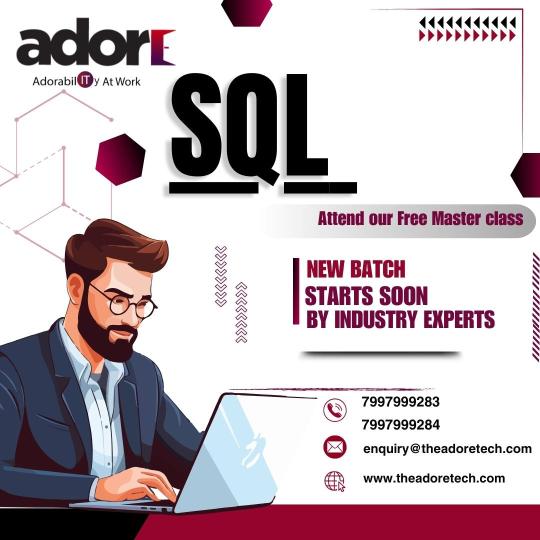
Adore Technologies,
"Unlock the power of data with our comprehensive SQL course! Join us on a journey to master Structured Query Language and delve into the world of efficient database management and analysis. Let's transform your career prospects together! #SQLMastery #DataDrivenFuture"
#digital illustration#devops#deep learning#data science#cybersecurity#power bi#ielts#gcp data engineer training in ameerpet#digital marketing#machinelearning#sqlserver#sql course#sqlexperts#educación#bachelors degree
1 note
·
View note
Text
#onlinetraining#awscloud#aws devops#java#javascript#azure devops#gcp online training#salesforce#datascience#business analytics
0 notes
Text
☁️ Cloud Computing Courses for Beginners (2025): Where to Start and What to Expect
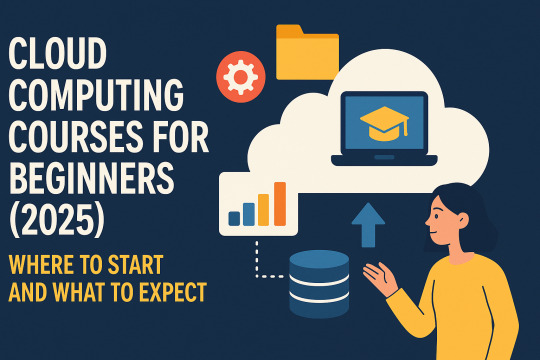
👨🎓 New to Tech? Wondering if You Can Learn Cloud Computing?
You’ve seen the job listings. You’ve heard about AWS, Azure, and Google Cloud. You might’ve even asked yourself, “Is this something I can learn, or is it only for experienced developers?”
Here’s the honest answer: Yes, you absolutely can learn cloud computing—even as a beginner. And no—you don’t need to be a coder to get started.
🧠 What Exactly Is Cloud Computing?
Let’s break it down in real-world terms.
Cloud computing is about accessing technology services (like servers, storage, and databases) over the internet instead of owning them physically. Just like you stream music without downloading every song, companies use cloud platforms to run apps without buying physical machines.
This makes cloud computing:
🔄 Scalable
⚡ Fast
💰 Cost-effective
🌐 Accessible from anywhere
Think of it as “IT on rent.”
🌐 What Are the Major Cloud Platforms?
There are three major players in the cloud computing space:
🔹 Amazon Web Services (AWS)
Largest market share globally
Great documentation and job demand
Ideal for beginners starting a cloud career
🔹 Microsoft Azure
Preferred by companies already using Microsoft services
Common in large enterprises and MNCs
Works well for IT support engineers or Windows admins
🔹 Google Cloud Platform (GCP)
Known for machine learning, analytics, and modern web apps
Growing ecosystem with startups and AI companies
Ideal for learners with interest in data + development
🎓 What to Expect from a Beginner-Friendly Cloud Course?
The right course should cover:
Cloud concepts: IaaS, PaaS, SaaS
Platform navigation (AWS Console, Azure Portal, GCP Dashboard)
Virtual Machines, storage, identity & access
Networking and basic security setup
Hands-on labs and small projects
Guidance for entry-level certifications
And most importantly, it should be beginner-friendly—not overloaded with theory or code.
🧑🏫 Why Learn Cloud with NareshIT?
At NareshIT, we’ve trained over 100,000 students in real-world IT skills. Our cloud computing courses are designed to help absolute beginners start from scratch, learn hands-on, and become confident enough to apply for jobs or certifications within weeks.
📘 NareshIT’s Cloud Computing Courses for Beginners
✅ AWS Cloud Foundations (Beginner Level)
Duration: 60 Days
Topics: EC2, IAM, S3, Lambda, VPC
Bonus: Live labs, project guidance, AWS Cloud Practitioner & Associate certification prep
Outcome: Ready for junior cloud jobs & support roles
✅ Azure Essentials Course (Beginner + Admin)
Duration: 45 Days
Topics: Azure AD, VMs, Blob Storage, Azure Monitor
Bonus: AZ-900 + AZ-104 prep, DevOps preview
Outcome: Ideal for support engineers and system admins
✅ GCP Starter Course (Beginner + Cloud Native Tools)
Duration: 30 Days
Topics: Compute Engine, IAM, BigQuery, Cloud Functions
Bonus: GCP Associate Cloud Engineer certification coaching
Outcome: Great for data lovers and devs entering cloud
🎓 DevOps with Multi-Cloud Training in KPHB by NareshIT
Located in Hyderabad’s tech-learning hub, NareshIT’s DevOps with Multi-Cloud Training in KPHB is tailored for:
✅ Beginners who want an IT job fast
✅ Professionals switching from support/manual testing
✅ Freshers looking for job-ready cloud + DevOps skills
🧾 Course Highlights:
Cloud Platforms Covered: AWS, Azure, GCP
DevOps Tools: Git, Jenkins, Docker, Kubernetes, Terraform
Duration: ~60 days
Batch Options: Weekday, Weekend, Fast-track
Includes: Real-world projects, certification support, job readiness prep
Location: KPHB, Hyderabad (Online + Offline options)
📅 New Batches Are Starting Now Choose from weekday, weekend, or fast-track options based on your schedule.
👉 Check NareshIT's Latest Cloud Batches Here
🧩 Bonus: Why Learning Cloud Computing Is Worth It
💼 High-demand job roles: Cloud support, DevOps, Admin
💸 Strong entry-level salaries: ₹4.5 to ₹7 LPA (for certified freshers)
🌱 Fast career growth: Start simple, grow into architecture or security
🌍 Global opportunities: Remote jobs across India, US, UAE, and more
You don’t need to master everything at once. Just start with one platform. And with the right mentor, you'll move faster than you thought possible.
#DevOpsWithMultiCloud#CloudCoursesHyderabad#LearnAWSAzureGCP#CareerInCloud#DevOpsForBeginners#CloudSkillsIndia#MultiCloudTrainingIndia#TechJobsHyderabad#CloudCertifications2025
0 notes
Text
Powering Innovation with Data Engineering Solutions in Toronto – cdatainsights
In an era where every click, transaction, and interaction creates data, the ability to harness that information has become a competitive necessity. Businesses across industries are turning to data engineering solutions in Toronto to turn complex, unstructured data into usable insights. At cdatainsights, we deliver advanced data engineering and machine learning services designed to help organizations make smarter, faster decisions.
Whether you are building a new analytics infrastructure from the ground up or optimizing an existing one, our specialized data engineering service in GTA ensures your systems are scalable, secure, and insight-ready.
What is Data Engineering and Why It’s Crucial
Data engineering is the critical first step in the data lifecycle. It involves the architecture and development of pipelines that collect, process, and store data in formats suitable for analytics, dashboards, and machine learning models. Without well-designed data systems, your business risks relying on outdated or inaccurate information.
cdatainsights provides complete data engineering solutions in Toronto — ensuring that your data ecosystem is not just functional but future-proof. We build robust data frameworks that support:
Real-time and batch data ingestion
Data normalization and transformation
Centralized data lakes and warehouses
Monitoring and logging for data reliability
Seamless integration with BI tools and ML models
Bridging the Gap: Data Engineering and Machine Learning
Machine learning is only as effective as the data it's trained on. That’s why we focus on the intersection of data engineering and machine learning to deliver holistic, outcome-focused solutions.
Our experts help you:
Prepare and label training datasets
Automate data workflows for continuous ML model training
Deploy models into production with minimal latency
Ensure feedback loops for real-time model improvement
From sentiment analysis and predictive modeling to personalized recommendations, we help you use ML in ways that directly impact your KPIs.
Custom Data Engineering Service in GTA – Tailored for Your Industry
As a Toronto-based company, we understand the unique challenges and opportunities facing local businesses. Our data engineering service in GTA is customized to meet industry-specific needs, including:
➤ Finance & Fintech
Build systems for fraud detection, real-time transaction processing, and customer behavior analysis.
➤ Healthcare & Life Sciences
Enable data-driven patient care with EHR integration, medical device data pipelines, and secure data governance.
➤ Retail & E-Commerce
Power your customer experience with real-time product recommendations, demand forecasting, and supply chain visibility.
➤ Manufacturing & IoT
Use IoT sensor data to optimize operations, monitor equipment, and drive predictive maintenance.
Why Businesses Trust cdatainsights
We’re not just a service provider — we’re your strategic partner in digital transformation. Here's why businesses choose cdatainsights for data engineering solutions in Toronto:
✅ Toronto-Based, GTA-Focused Local expertise means quicker turnarounds, onsite collaboration, and deep knowledge of regional regulations and market trends.
✅ Full-Stack Data Capabilities From data lakes and stream processing to advanced ML integrations — we cover it all.
✅ Cloud-Native & Scalable We build cloud-agnostic solutions using AWS, Azure, or GCP, ensuring flexibility and performance.
✅ Security-First Approach Data privacy and compliance are core to every solution we deliver — including HIPAA, PIPEDA, and SOC standards.
Technologies We Use
Our tech stack includes the latest in data and cloud innovation:
Data Processing: Apache Spark, Airflow, Kafka, dbt
Storage & Warehousing: Snowflake, BigQuery, Redshift, Delta Lake
Cloud Platforms: AWS, Azure, Google Cloud
Orchestration & DevOps: Docker, Kubernetes, Terraform
ML & AI: TensorFlow, Scikit-Learn, PyTorch, MLFlow
Get Started with cdatainsights Today
If you're looking for reliable, expert-driven data engineering service in GTA, cdatainsights is your go-to partner. Our team is ready to help you organize, optimize, and activate your data to drive real business value.
🚀 Take the next step in your data transformation journey.
📞 Contact cdatainsights today to schedule your free consultation.
cdatainsights – Engineering Data. Empowering Decisions.
#data engineering solutions in Toronto#data engineering and machine learning#data engineering service in Gta
1 note
·
View note
Text
Why a DevOps Cost Calculator Is Essential for Scalable DevOps in 2025

In today’s fast-paced digital economy, organizations are under constant pressure to deliver software faster, better, and more reliably. DevOps—a blend of development and operations—is the go-to strategy for achieving that agility. But how do you budget for DevOps in a way that’s transparent and scalable? That’s where a DevOps cost calculator becomes indispensable.
Whether you’re launching a new product or optimizing an existing delivery pipeline, knowing the projected cost of your DevOps strategy helps you avoid budget overruns. The DevOps cost calculator allows organizations to model expected costs and compare various deployment scenarios. This ensures you're not only speeding up your software delivery but also doing so in a financially sustainable manner.
Understanding the Role of a DevOps Cost Calculator
A DevOps cost calculator is a tool that helps organizations estimate the financial resources needed for implementing DevOps strategies. It accounts for factors like infrastructure, tools, personnel, automation, and maintenance. By using a calculator, decision-makers can simulate various team sizes, toolchains, cloud costs, and operational scopes to forecast expenses.
For those wondering How to hire DevOps Developers, a calculator also provides insights into the costs associated with in-house vs. outsourced talent. This becomes particularly helpful when deciding on hiring models and managing DevOps at scale.
Why Accurate Cost Estimation Matters in DevOps
DevOps is not a one-size-fits-all approach. Every organization has unique needs depending on team size, application complexity, cloud usage, and automation levels. A DevOps cost calculator provides a customized overview of these factors, making it easier to allocate resources wisely.
Budget estimation also improves stakeholder communication. When teams can present a detailed cost analysis using a DevOps cost calculator, they’re more likely to secure approvals and avoid mid-project financial surprises. This clarity enhances trust and fosters smoother implementation across departments, especially when engaging with a custom software development company for end-to-end delivery.
Core Components in a DevOps Cost Calculator
When using a DevOps cost calculator, you’ll typically input the following:
Team composition: Number of developers, operations engineers, and QA testers.
Tooling and automation: CI/CD platforms, monitoring tools, container services.
Infrastructure: Cloud usage (AWS, Azure, GCP), servers, network configurations.
Security & compliance: Firewalls, encryption tools, compliance frameworks.
Training & support: Onboarding costs, certifications, support staff.
Many calculators also allow advanced forecasting for integrations, scaling, and high availability architecture—all key considerations from an SDLC complete guide perspective.
Who Should Use a DevOps Cost Calculator?
A DevOps cost calculator isn’t just for financial teams. It’s a powerful tool for:
CTOs and CIOs planning strategic DevOps initiatives.
Project managers tasked with budgeting DevOps pipelines.
Startups wanting to scale infrastructure without waste.
Enterprise architects validating large-scale deployments.
If you're asking yourself, Why Should You Hire DevOps Developers?, the calculator can clarify the cost benefits of building a DevOps team, highlighting potential ROI and trade-offs between in-house and external experts.
Benefits of Using a DevOps Cost Calculator
Using a DevOps cost calculator yields several key advantages:
Budget predictability: Avoid cost overruns by estimating before deployment.
Decision-making clarity: Compare tools, hiring models, and infrastructures.
Better vendor selection: Aligns your needs with what vendors can offer.
Team alignment: Keeps everyone on the same page with clear financial targets.
Partnering with a skilled DevOps app development company further enhances these benefits by helping interpret the calculator's output into actionable strategies. These experts understand how to balance cost with performance, reliability, and compliance.
Common Mistakes to Avoid When Using a DevOps Cost Calculator
While a DevOps cost calculator is a powerful tool, it’s only effective when used correctly. Common pitfalls include:
Underestimating ongoing costs such as monitoring, backups, and security.
Ignoring training and onboarding expenses.
Assuming static resource usage, especially in cloud-native environments.
Overlooking license fees for third-party tools.
To get the most accurate estimates, ensure your data is current and comprehensive. Collaboration with a custom software development company or DevOps consultant can help fine-tune your inputs for precision.
Comparing DevOps Scenarios with a Cost Calculator
One of the most valuable features of a DevOps cost calculator is the ability to simulate different implementation paths. For instance, you can compare:
On-premises vs. cloud deployments
Manual testing vs. automated testing
Container-based vs. serverless architecture
In-house vs. outsourced DevOps engineers
These simulations are critical for long-term planning and strategic decisions. Incorporating the insights from an SDLC complete guide into these scenarios helps align technical choices with business goals.
Integrating Cost Estimation into Your DevOps Strategy
Rather than treating cost estimation as an isolated task, make it a central part of your DevOps planning. Use a DevOps cost calculator during the initial planning stages and update it regularly as project needs evolve.
This not only ensures ongoing cost control but also promotes accountability. Plus, having a consistent financial overview supports better discussions with investors, clients, and stakeholders who want to see clear, data-backed reasoning for your DevOps roadmap.
Consulting with a DevOps app development company at this stage can turn your cost analysis into a competitive advantage, ensuring every dollar spent translates into agility, speed, and resilience.
Conclusion: The DevOps Cost Calculator as a Strategic Tool
In 2025, digital success will be defined by how fast and efficiently companies can build and deploy software. A DevOps cost calculator empowers businesses to make that happen without financial guesswork. From cost modeling and team planning to scaling strategies and vendor negotiations, this tool is indispensable for any forward-thinking organization.
Whether you're wondering How to hire DevOps Developers, planning a new CI/CD pipeline, or evaluating your current infrastructure, don’t proceed without first leveraging a DevOps cost calculator. It’s more than just a budgeting tool—it’s a roadmap for scalable, cost-effective DevOps success.
0 notes
Text
GCP DevOps Online Training | GCP DevOps Training in Hyderabad
Mastering Multi-Cloud Strategies with GCP DevOps Training
In today's fast-evolving tech landscape, businesses are increasingly leveraging GCP DevOps Training to streamline workflows and adopt multi-cloud strategies. Google Cloud Platform (GCP) has emerged as a preferred choice for enterprises seeking flexibility, scalability, and innovation in their DevOps pipelines. With the right approach to multi-cloud strategies, organizations can optimize performance, improve resilience, and reduce costs while maintaining a competitive edge.
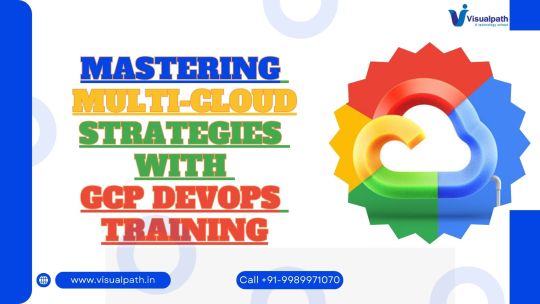
Understanding Multi-Cloud Strategies
A multi-cloud strategy involves the use of services from multiple cloud providers, such as Google Cloud, AWS, and Azure. This approach allows organizations to select the best-in-class services tailored to specific needs, avoid vendor lock-in, and enhance operational resilience. GCP, with its robust tools and seamless DevOps capabilities, plays a pivotal role in helping organizations implement multi-cloud strategies efficiently.
GCP DevOps Training in Hyderabad provides a comprehensive understanding of GCP's role in multi-cloud environments. Through hands-on training, professionals learn how to deploy and manage Kubernetes clusters, implement Infrastructure as Code (IaC), and integrate CI/CD pipelines across multiple platforms. This knowledge is essential for ensuring that applications run smoothly in diverse cloud environments.
Why GCP DevOps is Ideal for Multi-Cloud
Seamless Integration with Other Cloud Platforms GCP supports hybrid and multi-cloud architectures with tools like Anthos, which enable consistent operations across environments. Anthos simplifies managing applications on GCP, AWS, and on-premises infrastructure, making it a cornerstone of multi-cloud strategies.
Unified Monitoring and Management Tools such as Stackdriver (now part of Google Cloud Operations Suite) provide centralized monitoring and logging capabilities, ensuring visibility across all cloud environments. This is a critical aspect covered in GCP DevOps Certification Training, where professionals learn to leverage these tools for effective multi-cloud management.
Enhanced Security Features
Security remains a major concern in multi-cloud setups. GCP addresses this with features like Identity and Access Management (IAM), Shielded VMs, and encryption by default, ensuring robust protection for applications and data. Professionals undergoing GCP DevOps Training in Hyderabad gain hands-on experience in implementing these security features to safeguard multi-cloud deployments
Key Benefits of Multi-Cloud Strategies with GCP DevOps
Cost Optimization: Leverage the pricing advantages of different providers while avoiding over-provisioning.
High Availability: Reduce the risk of downtime by distributing workloads across multiple cloud platforms.
Scalability: Scale applications dynamically across multiple platforms without service interruptions.
Flexibility: Choose the best services from each cloud provider, such as GCP's machine learning tools or AWS's storage solutions.
Through GCP DevOps Certification Training, professionals can master these benefits, enabling businesses to maximize their cloud investments.
Implementing Multi-Cloud Strategies with GCP DevOps
Adopting a multi-cloud approach requires careful planning and the right skill set. The following steps highlight how GCP DevOps supports this process:
Planning and Architecture: Create a strong framework that guarantees seamless interaction between different cloud providers. Training programs, such as GCP DevOps Training, emphasize designing scalable and resilient architectures for multi-cloud environments.
Deployment and Management: Leverage GCP tools like Terraform for IaC and Kubernetes Engine for container orchestration. These tools enable consistent deployments across clouds, reducing complexity.
Continuous Integration and Delivery (CI/CD): Implement CI/CD pipelines with GCP Cloud Build, allowing automated testing and deployments. This ensures rapid and reliable application updates, a core focus in GCP DevOps Training in Hyderabad.
Monitoring and Optimization: Use GCP’s monitoring tools to track performance and identify areas for improvement. Regular monitoring is crucial for maintaining efficiency and avoiding potential issues in multi-cloud setups.
Challenges and Solutions in Multi-Cloud with GCP DevOps
Adopting a multi-cloud strategy is not without challenges. Common issues include interoperability between platforms, increased complexity, and managing security across diverse environments. However, professionals trained through GCP DevOps Certification Training are equipped to tackle these challenges. They learn best practices for configuring seamless integrations, automating processes, and maintaining a unified security posture.
Conclusion
The future of cloud computing lies in multi-cloud strategies, and mastering this approach with GCP DevOps Training is a game-changer for IT professionals and organizations alike. Google Cloud Platform, with its robust tools and innovative features, simplifies the complexities of multi-cloud management.
Whether you're looking to enhance your skills or implement a resilient cloud strategy for your organization, GCP DevOps Training in Hyderabad provides the expertise needed to excel. With proper training and a well-structured plan, businesses can leverage the power of multi-cloud to drive innovation, improve agility, and achieve operational excellence.
Visualpath is the Leading and Best Software Online Training Institute in Hyderabad. Avail complete GCP DevOps Online Training Worldwide. You will get the best course at an affordable cost.
Attend Free Demo
Call on - +91-9989971070.
Visit: https://visualpathblogs.com/
WhatsApp: https://www.whatsapp.com/catalog/919989971070
Visit https://www.visualpath.in/online-gcp-devops-certification-training.html
#GCP DevOps Training#GCP DevOps Training in Hyderabad#GCP DevOps Certification Training#GCP DevOps Online Training#DevOps GCP Online Training in Hyderabad#GCP DevOps Online Training Institute#DevOps on Google Cloud Platform Online Training#DevOps GCP#GCP DevOps#Google#Google Cloud
1 note
·
View note
Text
Future with Cloud Computing Classes in Pune at Ethans Tech
In today’s rapidly evolving digital landscape, cloud computing has become the backbone of modern IT infrastructure. Whether you’re a fresh graduate or an experienced IT professional, learning cloud computing is essential to stay competitive. If you're looking for top-rated cloud computing classes in Pune, Ethans Tech stands out as a trusted institute offering industry-relevant training and certifications.
Why Cloud Computing?
With businesses shifting to cloud platforms like AWS, Azure, and Google Cloud, there's a massive demand for professionals skilled in cloud technologies. A cloud computing course in Pune equips you with the knowledge to build, deploy, and manage applications on the cloud — a must-have skill in today’s job market.
What Ethans Tech Offers
Ethans Tech provides comprehensive cloud computing classes in Pune designed for both beginners and working professionals. Here's what makes Ethans Tech a preferred choice:
Hands-On Training: Learn through live projects, real-time case studies, and practical scenarios.
Experienced Instructors: Courses are led by certified trainers with rich industry experience.
Flexible Batches: Weekday and weekend options to suit your schedule.
Career Support: Resume building, mock interviews, and placement assistance included.
Certifications: Prepare for global cloud computing certification in Pune like AWS Certified Solutions Architect, Microsoft Azure Fundamentals, and Google Cloud Engineer.
Key Features of the Cloud Computing Course in Pune
Introduction to Cloud Models (IaaS, PaaS, SaaS)
Deep dive into AWS, Azure, and GCP services
Virtual machines, networking, storage, and security concepts
DevOps integration with cloud platforms
Guidance for cloud certifications with mock tests and Q&A sessions
Build a Career in Cloud with Ethans Tech
If you're serious about upgrading your skills, enrolling in a cloud computing certification in Pune can be your gateway to high-paying roles such as Cloud Engineer, DevOps Engineer, Cloud Solutions Architect, and more. Ethans Tech not only trains you but also ensures you're industry-ready.
Ready to Take the Leap?
Join Ethans Tech – the leading institute for cloud computing classes in Pune – and take a confident step toward a promising IT career.
Visit Ethans Tech today or call now to book your free demo session!
0 notes
Text
The Cost of Hiring a Microservices Engineer: What to Expect

Many tech businesses are switching from monolithic programs to microservices-based architectures as software systems get more complicated. More flexibility, scalability, and deployment speed are brought about by this change, but it also calls for specialized talent. Knowing how much hiring a microservices engineer would cost is essential to making an informed decision.
Understanding the factors that affect costs can help you better plan your budget and draw in the best personnel, whether you're developing a new product or updating outdated systems.
Budgeting for Specialized Talent in a Modern Cloud Architecture
Applications composed of tiny, loosely linked services are designed, developed, and maintained by microservices engineers. These services are frequently implemented separately and communicate via APIs. When you hire a microservices engineer they should have extensive experience with distributed systems, API design, service orchestration, and containerization.
They frequently work with cloud platforms like AWS, Azure, or GCP as well as tools like Docker, Kubernetes, and Spring Boot. They play a crucial part in maintaining the scalability, modularity, and maintainability of your application.
What Influences the Cost?
The following variables affect the cost of hiring a microservices engineer:
1. Level of Experience
Although they might charge less, junior engineers will probably require supervision. Because they can independently design and implement reliable solutions, mid-level and senior engineers with practical experience in large-scale microservices projects attract higher rates.
2. Place
Geography has a major impact on salaries. Hiring in North America or Western Europe, for instance, is usually more expensive than hiring in Southeast Asia, Eastern Europe, or Latin America.
3. Type of Employment
Are you hiring contract, freelance, or full-time employees? For short-term work, freelancers may charge higher hourly rates, but the total project cost may be less.
4. Specialization and the Tech Stack
Because of their specialised knowledge, engineers who are familiar with niche stacks or tools (such as event-driven architecture, Istio, or advanced Kubernetes usage) frequently charge extra.
Use a salary benchmarking tool to ensure that your pay is competitive. This helps you set expectations and prevent overpaying or underbidding by providing you with up-to-date market data based on role, region, and experience.
Hidden Costs to Consider
In addition to the base pay or rate, you need account for:
Time spent onboarding and training
Time devoted to applicant evaluation and interviews
The price of bad hires (in terms of rework or delays)
Continuous assistance and upkeep if you're starting from scratch
These elements highlight how crucial it is to make a thoughtful, knowledgeable hiring choice.
Complementary Roles to Consider
Working alone is not how a microservices engineer operates. Several tech organizations also hire cloud engineers to oversee deployment pipelines, networking, and infrastructure. Improved production performance and easier scaling are guaranteed when these positions work closely together.
Summing Up
Hiring a microservices engineer is a strategic investment rather than merely a cost. These engineers with the appropriate training and resources lays the groundwork for long-term agility and scalability.
Make smart financial decisions by using tools such as a pay benchmarking tool, and think about combining your hire with cloud or DevOps support. The correct engineer can improve your architecture's speed, stability, and long-term value for tech businesses updating their apps.
0 notes
Text
Step-by-Step Guide to Hiring an MLOps Engineer
: Steps to Hire an MLOps Engineer Make the role clear.
Decide your needs: model deployment, CI/CD for ML, monitoring, cloud infrastructure, etc.
2. Choose the level (junior, mid, senior) depending on how advanced the project is.
Create a concise job description.
Include responsibilities like:
2. ML workflow automation (CI/CD)
3. Model lifecycle management (training to deployment)
4. Model performance tracking
5. Utilizing Docker, Kubernetes, Airflow, MLflow, etc.
: Emphasize necessary experience with ML libraries (TensorFlow, PyTorch), cloud platforms (AWS, GCP, Azure), and DevOps tools.
: Source Candidates
Utilize dedicated platforms: LinkedIn, Stack Overflow, GitHub, and AI/ML forums (e.g., MLOps Community, Weights & Biases forums).
Use freelancers or agencies on a temporary or project-by-project basis.
1. Screen Resumes for Technical Skills
2. Look for experience in:
3. Building responsive machine learning pipelines
4 .Employing in a cloud-based environment
5. Managing manufacturing ML systems
: Technical Interview & Assessment
Add coding and system design rounds.
Check understanding of:
1.CI/CD for ML
2. Container management.
3. Monitoring & logging (e.g., Prometheus, Grafana)
4. Tracking experiments
Optional: hands-on exercise or take-home assignment (e.g., build a simple training-to-deployment pipeline).
1. Evaluate Soft Skills & Culture Fit
2. Collaboration with data scientists, software engineers, and product managers is necessary.
3. Assess communication, documentation style, and collaboration.
4. Make an Offer & Onboard
5. Offer thorough onboarding instructions.
6. Begin with a real project to see the impact soon.
Mlops engineer
???? Most Important Points to Remember MLOps ≠ DevOps: MLOps introduces additional complexity — model versioning, drift, data pipelines.
Infrastructure experience is a must: Hire individuals who have experience with cloud, containers, and orchestration tools.
Cross-function thinking: This is where MLOps intersect IT, software development, and machine learning—clear communications are crucial.
Knowledge tools: MLflow, Kubeflow, Airflow, DVC, Terraform, Docker, and Kubernetes are typical.
Security and scalability: Consider if the candidate has developed secure and scalable machine learning systems.
Model monitoring and feedback loops: Make sure they know how to check and keep the model’s performance good over time.
0 notes
Text
How Long Does It Take to Learn Cloud Computing?
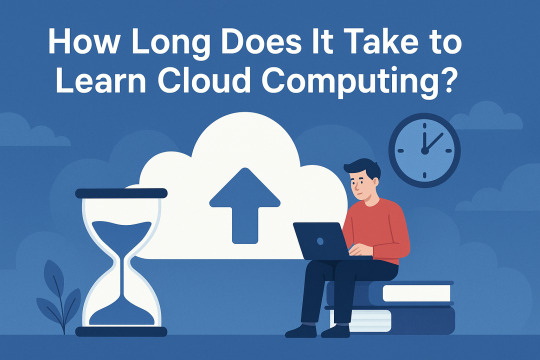
It’s 2025. Most tech roles — from app development to data analytics — mention “cloud” in the job description. Whether you’re a student, a working professional, or someone switching careers, you’ve probably wondered:
“How long will it take me to actually learn cloud computing?”
The short answer? Anywhere between 30 to 90 days — depending on your learning path, goals, and support system.
But before we talk timeframes, let’s understand what cloud computing really is.
☁️ What is Cloud Computing? (In Simple Terms)
In the old days, companies needed large rooms filled with servers to host websites or run software. That meant high costs, physical space, and endless maintenance.
Cloud computing changed everything.
Today, companies rent computing power, storage, and tools from cloud service providers over the internet. This means:
No need to buy hardware
Scale up or down anytime
Pay only for what you use
Every time you use Google Drive, stream Netflix, or upload a file to Dropbox — you’re using the cloud.
🧑💻 Who Uses Cloud Computing?
Everyone — from startups to governments. Industries like banking, healthcare, education, logistics, and media all rely on the cloud for flexibility, speed, and cost-efficiency.
And that’s exactly why cloud professionals are in such high demand.
🌐 The 3 Major Cloud Platforms (You Only Need to Start with One)
Amazon Web Services (AWS)
Microsoft Azure
Google Cloud Platform (GCP)
👉 Most beginners choose one platform to start with. Later, multi-cloud skills come naturally.
🗓️ So, How Long Does It Really Take to Learn Cloud Computing?
Here’s a breakdown from beginner to job-ready:
Learning StageTime NeededUnderstand cloud basics2–3 weeksLearn one cloud platform (AWS/Azure/GCP)4–6 weeksPractice hands-on projects2–4 weeksPrepare for certifications6–8 weeksBuild resume + apply for jobs2–3 months (total path)
✅ Total: 60–90 days, if you learn consistently with real guidance.
🎓 How NareshIT Helps You Learn Cloud — Without Getting Overwhelmed
We understand that learning cloud from scratch can feel overwhelming. That’s why NareshIT’s cloud programs are designed specifically for beginners, freshers, and working professionals who want structure, mentorship, and results.
🔹 AWS Cloud Training — From Basics to Certification
Duration: 60 Days
Topics: EC2, IAM, Lambda, S3, VPC
Outcome: AWS Cloud Practitioner + Associate Architect
Perks: Live labs, real projects, mock interviews
🔹 Microsoft Azure Course — Admin, DevOps & More
Duration: 45 Days
Topics: VMs, Blob Storage, Azure AD, DevOps with multi cloud in Kphb .
Certifications: AZ-900 & AZ-104
Best For: System Admins, career switchers, IT support
🔹 Google Cloud (GCP) Course — Build with AI & Big Data
Duration: 30 Days
Topics: Compute Engine, IAM, App Engine, BigQuery
Certifications: Associate Cloud Engineer
Best For: Data science, Python learners, analytics-focused roles
📅 New Batches Just Opened at NareshIT 👉 Click here to view our cloud training schedules Choose from online, offline, and fast-track options.
🔍 What Makes NareshIT Different?
🧑🏫 Mentors with real cloud project experience
🧪 Hands-on labs, not just slides
🎓 Certification prep + resume building
💬 Live doubt-clearing sessions
💼 Placement guidance after course completion
Whether you’re studying on weekends or starting full-time, we’ll help you move from theory to hiring room.
🚀 Final Thoughts: The First Step Matters Most
You don’t need a fancy degree to start. You don’t need to be a tech wizard. You just need to begin — with a structured path and the right support.
At NareshIT, we’ve trained over 100,000 learn
#CloudComputing#LearnCloud#AWS#Azure#GoogleCloud#CloudCertifications#DevOps#TechCareers#ITTraining#NareshIT#Upskill#CareerGrowth
0 notes
Text
18 Highest-Paying Tech and IT Jobs for 2025 — #7 Will Shock You!

Thinking of switching careers or doubling your salary in tech? You’re not alone. The demand for tech and IT talent is skyrocketing, but not all jobs are created equal. Some roles quietly pull in six-figure salaries plus bonuses, while others fade into the background. The question is, are you chasing the right role in 2025?
We’ve compiled the top 18 highest-paying tech and IT jobs based on current salary data, emerging trends, and real employer demand. And trust us—some of these roles didn’t even exist a few years ago.
1. AI/ML Engineer
Salary: $140,000–$180,000
Artificial Intelligence and Machine Learning engineers are hot property right now. Companies in every sector are hiring talent to build smarter systems, from chatbots to predictive analytics.
2. Data Scientist
Salary: $130,000–$170,000
Still one of the most in-demand and well-paid roles. Why? Because every business is drowning in data, and someone needs to make sense of it.
3. Cloud Solutions Architect
Salary: $135,000–$185,000
With nearly everything moving to the cloud, these pros are essential. Think AWS, Azure, GCP—big platforms, big paychecks.
4. Cybersecurity Manager
Salary: $125,000–$160,000
Security breaches cost millions, so companies are paying a premium for cybersecurity experts who can protect their digital assets.
5. DevOps Engineer
Salary: $115,000–$150,000
Automation and continuous delivery are the backbone of modern development. DevOps engineers streamline the entire software lifecycle—and get paid handsomely for it.
6. AI Prompt Engineer
Salary: $110,000–$150,000
Yes, prompt engineering is now a real job. With AI models like ChatGPT and Gemini dominating workflows, prompt engineers are optimizing responses and training systems across industries.
7. Blockchain Developer
Salary: $120,000–$175,000
Still think blockchain is just about crypto? Think again. It’s being used in healthcare, supply chains, and identity management, and developers who understand it are in short supply.
8. Full-Stack Developer
Salary: $100,000–$140,000
Still one of the most versatile and bankable roles in tech. If you can build front-end and back-end apps, you’ll always be valuable.
9. AI Research Scientist
Salary: $150,000–$200,000+
These are the people pushing the boundaries of what's possible in artificial intelligence. The deeper your knowledge, the deeper the paycheck.
10. IT Program Manager
Salary: $110,000–$145,000
They don’t just manage projects—they oversee multi-million dollar systems. This role combines tech knowledge with leadership, and it pays accordingly.
11. Solutions Engineer (Pre-Sales)
Salary: $100,000–$130,000 + bonuses
A rare blend of tech and sales, these engineers demo, pitch, and tailor solutions to big clients. If you’re technical and persuasive, this is your sweet spot.
12. Product Manager (Tech)
Salary: $120,000–$160,000
PMs in tech are the visionaries. They lead product development from idea to launch—and companies pay big to get it right.
13. Systems Architect
Salary: $120,000–$155,000
These professionals design the high-level structure of IT systems. It’s a critical, senior-level role, and the compensation matches the responsibility.
14. Chief Information Security Officer (CISO)
Salary: $180,000–$250,000
This is the top security job in any tech-driven company. You’ll need years of experience—but the payoff? Massive.
15. Machine Learning Ops (MLOps) Engineer
Salary: $115,000–$145,000
Think DevOps for ML. These experts help take AI models from research to production and make sure they scale securely.
16. Mobile App Developer
Salary: $100,000–$135,000
With billions of smartphone users worldwide, skilled mobile devs are still raking it in—especially those working in fintech and health apps.
17. Network and Cloud Security Engineer
Salary: $110,000–$145,000
It’s not just about building networks, it’s about keeping them safe. And with cloud threats rising, this niche is more critical than ever.
18. Tech Consultant (Freelance or Firm-Based)
Salary: Varies ($90,000–$200,000+)
Want flexibility and a fat paycheck? Top consultants with niche expertise like ERP, AI, or cloud migrations are booked months in advance.
Final Thoughts: Which Role Is Right for You?
Not every job on this list requires a CS degree. Some roles reward specialization, certifications, or even strong business acumen. The real winners in 2025 will be those who match their strengths with emerging demand. So the question is, are you positioned for where tech is going, not just where it’s been?
0 notes
Text
Big Data Course in Kochi: Transforming Careers in the Age of Information
In today’s hyper-connected world, data is being generated at an unprecedented rate. Every click on a website, every transaction, every social media interaction — all of it contributes to the vast oceans of information known as Big Data. Organizations across industries now recognize the strategic value of this data and are eager to hire professionals who can analyze and extract meaningful insights from it.
This growing demand has turned big data course in Kochi into one of the most sought-after educational programs for tech enthusiasts, IT professionals, and graduates looking to enter the data-driven future of work.
Understanding Big Data and Its Relevance
Big Data refers to datasets that are too large or complex for traditional data processing applications. It’s commonly defined by the 5 V’s:
Volume – Massive amounts of data generated every second
Velocity – The speed at which data is created and processed
Variety – Data comes in various forms, from structured to unstructured
Veracity – Quality and reliability of the data
Value – The insights and business benefits extracted from data
These characteristics make Big Data a crucial resource for industries ranging from healthcare and finance to retail and logistics. Trained professionals are needed to collect, clean, store, and analyze this data using modern tools and platforms.
Why Enroll in a Big Data Course?
Pursuing a big data course in Kochi can open up diverse opportunities in data analytics, data engineering, business intelligence, and beyond. Here's why it's a smart move:
1. High Demand for Big Data Professionals
There’s a huge gap between the demand for big data professionals and the current supply. Companies are actively seeking individuals who can handle tools like Hadoop, Spark, and NoSQL databases, as well as data visualization platforms.
2. Lucrative Career Opportunities
Big data engineers, analysts, and architects earn some of the highest salaries in the tech sector. Even entry-level roles can offer impressive compensation packages, especially with relevant certifications.
3. Cross-Industry Application
Skills learned in a big data course in Kochi are transferable across sectors such as healthcare, e-commerce, telecommunications, banking, and more.
4. Enhanced Decision-Making Skills
With big data, companies make smarter business decisions based on predictive analytics, customer behavior modeling, and real-time reporting. Learning how to influence those decisions makes you a valuable asset.
What You’ll Learn in a Big Data Course
A top-tier big data course in Kochi covers both the foundational concepts and the technical skills required to thrive in this field.
1. Core Concepts of Big Data
Understanding what makes data “big,” how it's collected, and why it matters is crucial before diving into tools and platforms.
2. Data Storage and Processing
You'll gain hands-on experience with distributed systems such as:
Hadoop Ecosystem: HDFS, MapReduce, Hive, Pig, HBase
Apache Spark: Real-time processing and machine learning capabilities
NoSQL Databases: MongoDB, Cassandra for unstructured data handling
3. Data Integration and ETL
Learn how to extract, transform, and load (ETL) data from multiple sources into big data platforms.
4. Data Analysis and Visualization
Training includes tools for querying large datasets and visualizing insights using:
Tableau
Power BI
Python/R libraries for data visualization
5. Programming Skills
Big data professionals often need to be proficient in:
Java
Python
Scala
SQL
6. Cloud and DevOps Integration
Modern data platforms often operate on cloud infrastructure. You’ll gain familiarity with AWS, Azure, and GCP, along with containerization (Docker) and orchestration (Kubernetes).
7. Project Work
A well-rounded course includes capstone projects simulating real business problems—such as customer segmentation, fraud detection, or recommendation systems.
Kochi: A Thriving Destination for Big Data Learning
Kochi has evolved into a leading IT and educational hub in South India, making it an ideal place to pursue a big data course in Kochi.
1. IT Infrastructure
Home to major IT parks like Infopark and SmartCity, Kochi hosts numerous startups and global IT firms that actively recruit big data professionals.
2. Cost-Effective Learning
Compared to metros like Bangalore or Hyderabad, Kochi offers high-quality education and living at a lower cost.
3. Talent Ecosystem
With a strong base of engineering colleges and tech institutes, Kochi provides a rich talent pool and a thriving tech community for networking.
4. Career Opportunities
Kochi’s booming IT industry provides immediate placement potential after course completion, especially for well-trained candidates.
What to Look for in a Big Data Course?
When choosing a big data course in Kochi, consider the following:
Expert Instructors: Trainers with industry experience in data engineering or analytics
Comprehensive Curriculum: Courses should include Hadoop, Spark, data lakes, ETL pipelines, cloud deployment, and visualization tools
Hands-On Projects: Theoretical knowledge is incomplete without practical implementation
Career Support: Resume building, interview preparation, and placement assistance
Flexible Learning Options: Online, weekend, or hybrid courses for working professionals
Zoople Technologies: Leading the Way in Big Data Training
If you’re searching for a reliable and career-oriented big data course in Kochi, look no further than Zoople Technologies—a name synonymous with quality tech education and industry-driven training.
Why Choose Zoople Technologies?
Industry-Relevant Curriculum: Zoople offers a comprehensive, updated big data syllabus designed in collaboration with real-world professionals.
Experienced Trainers: Learn from data scientists and engineers with years of experience in multinational companies.
Hands-On Training: Their learning model emphasizes practical exposure, with real-time projects and live data scenarios.
Placement Assistance: Zoople has a dedicated team to help students with job readiness—mock interviews, resume support, and direct placement opportunities.
Modern Learning Infrastructure: With smart classrooms, cloud labs, and flexible learning modes, students can learn in a professional, tech-enabled environment.
Strong Alumni Network: Zoople’s graduates are placed in top firms across India and abroad, and often return as guest mentors or recruiters.
Zoople Technologies has cemented its position as a go-to institute for aspiring data professionals. By enrolling in their big data course in Kochi, you’re not just learning technology—you’re building a future-proof career.
Final Thoughts
Big data is more than a trend—it's a transformative force shaping the future of business and technology. As organizations continue to invest in data-driven strategies, the demand for skilled professionals will only grow.
By choosing a comprehensive big data course in Kochi, you position yourself at the forefront of this evolution. And with a trusted partner like Zoople Technologies, you can rest assured that your training will be rigorous, relevant, and career-ready.
Whether you're a student, a working professional, or someone looking to switch careers, now is the perfect time to step into the world of big data—and Kochi is the ideal place to begin.
0 notes
Text
DevOps Engineer Courses List : Choices to Enhance Your Career
In today's highly-competitive tech world demand for competent DevOps engineers is increasing. As businesses shift to continuous integration and agile development, DevOps plays a crucial function in closing the gap between operations and development. No matter if you're an aspiring beginner into IT or a seasoned professional who wants to get better by taking a top-quality DevOps course could change your life.
To help you sort through the myriad of choices to choose from, we've put together the best DevOps engineering courses for 2025. These courses were chosen by their content high-quality, their relevance to industry as well as user feedback and their overall experience.
What are the importance of DevOps courses in 2025
Before we get into the syllabus Let's look at the reasons why learning DevOps is more crucial than ever before in 2025:
More automation: Organizations automatizing more processes, which makes DevOps techniques and tools vital.
Demand is growing: Companies are looking for engineers that can handle pipelines for CI/CD and infrastructure as code as well as cloud-based deployments.
Paying high salaries: DevOps engineers are among the highest-paid workers in the tech industry.
Therefore it's worth making the investment in the DevOps training course isn't only about gaining skills, but also about ensuring the future of your career.
Top DevOps Engineer Courses in 2025
Here's our selection of the top DevOps classes you can take this year:
1. Google Cloud DevOps Engineer Certification (Coursera)
Level Intermediate to Advanced Time of the course 4 to 6 months (at 5-10 hours/week)
This certificate for professionals issued by Google has been designed specifically for people who are looking to get hands-on experience in cloud-native DevOps methods. It includes Site reliability engineering (SRE) as well as CI/CD monitoring as well as deployment pipelines.
Highlights:
Led to students by Google Cloud experts
Hands-on labs using Google Cloud Platform (GCP)
It prepares you for an official DevOps Engineer certification exam.
2. DevOps Engineer Career Path (Codecademy)
Niveau from Beginner to Intermediate Duration: Self-paced
The structured career path offered by Codecademy is a great option for those who want to start at the beginning. You'll learn about Linux, Git, Docker, Kubernetes and other essential tools used by the DevOps engineer.
Highlights:
Interactive Coding Environment
Real-world projects and exercises
The course covers both technical and soft abilities. Covers both technical and soft
3. The Complete DevOps Engineer Course 2025 (Udemy)
Level All levels Duration 40plus hours
This top seller on Udemy is often updated and is packed with useful examples. From coding infrastructure by using Terraform to automation using Jenkins and Ansible It's a complete set of.
Highlights:
Access to lifetime access and downloadable materials
It covers AWS, Docker, Kubernetes and pipelines for CI/CD
Ideal for beginners as well as professionals.
4. Microsoft Certified: DevOps Engineer Expert (Microsoft Learn)
Level Intermediate to Advanced Duration: Depending on the learning speed
This certification is designed for engineers working on Microsoft Azure. The course combines theory and practical exercises that will assist you in the design and implementation of DevOps techniques by using Azure DevOps as well as GitHub.
Highlights:
Industry-recognized certification
In-depth integration Azure services
Excellent for corporate DevOps roles.
5. Linux Foundation DevOps Bootcamp
Niveau: Beginner to Intermediate Duration Time: 6 months
The course is offered through The Linux Foundation, this bootcamp offers two courses The first is an introduction to DevOps and Cloud Native Development. It's perfect for students seeking vendor-neutral, open-source-focused education.
Highlights:
The emphasis is on open-source tools
Forums that are supported by the community
A certificate of completion issued by the Linux Foundation
Bonus Picks
Here are some other areas worth looking into if you're searching for specific focus areas:
Kubernetes for DevOps Engineers (Pluralsight)
CI/CD Pipelines with Jenkins and GitLab (LinkedIn Learning)
AWS Certified DevOps Engineer - Professional (A Cloud Guru)
How to Pick the Right Course
The best DevOps course will depend on your professional stage and your goals for learning. Here's a quick guide:
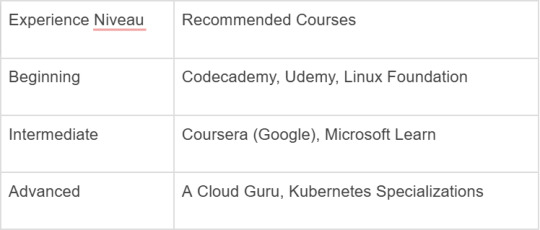
Also, think about the following prior to registering:
Course reviews and scores
Project work and hands-on labs
Industry-recognized certification
Support or mentorship available
Final Thoughts
In 2025, becoming a DevOps engineer will be more than being able to master some tools. This is about mastering systems, enhancing collaboration, and making it easier to deliver faster and more reliable software delivery. The above-mentioned courses give an excellent foundation and hands-on experience to be an effective DevOps professional.
Take that next step. If you're looking to brush on the latest technologies or beginning from scratch there's a program out available that's specifically tailored to your needs.
1 note
·
View note
Text
How can DevOps consulting help a business or project
DevOps consulting can bring significant benefits to a business or project, especially if you're dealing with bottlenecks in development, release cycles, or infrastructure management. Flycatch the best devops consulting company in Saudi Arabia helps explains breakdown of how DevOps consulting can help.
1. Process Optimization
DevOps consultants assess your current workflows (development, QA, operations) and identify inefficiencies. They’ll help streamline:
CI/CD pipelines (Continuous Integration/Continuous Deployment)
Testing & QA automation
Release management
Result: Faster, more reliable releases and quicker time-to-market.
2. Faster Delivery with Better Quality
By automating repetitive tasks (like builds, tests, deployments), DevOps enables rapid iteration without sacrificing stability. Consultants help you:
Build automated pipelines
Integrate with tools like Jenkins, GitLab CI, GitHub Actions, etc.
Create rollback and failover strategies
Result: You deploy more frequently, with fewer bugs.
3. Expert Guidance & Best Practices
Consultants bring a deep understanding of DevOps culture and tooling. They help instill:
Collaboration between devs, ops, and QA
Agile principles
Monitoring, observability, and alerting best practices
Result: A more resilient, proactive, and transparent dev environment.
4. Cloud & Infrastructure Management
If you're working with AWS, Azure, GCP, or hybrid setups, DevOps consultants can:
Automate infrastructure using IaC (Infrastructure as Code) tools like Terraform, Pulumi, or AWS CloudFormation
Set up container orchestration (e.g., Kubernetes)
Improve scalability, availability, and cost-efficiency
Result: More robust, scalable systems without manual overhead.
5. Risk Reduction
DevOps consultants design systems to handle failure gracefully and help introduce:
Rollback mechanisms
Blue/green and canary deployments
Security and compliance checks baked into pipelines (DevSecOps)
Result: Reduced downtime and fewer surprises in production.
6. Team Enablement & Training
Good consultants don’t just implement—they teach. Expect workshops, pair programming, and documentation to:
Upskill your current team
Reduce dependence on external help long-term
Result: Internal team growth and smoother handover. Our tailored Agile DevOps consulting company empower you to enhance efficiency and maximize business value. Our expert solutions enable task automation, improved collaboration, and rapid product updates, ensuring your competitive edge in the market
0 notes